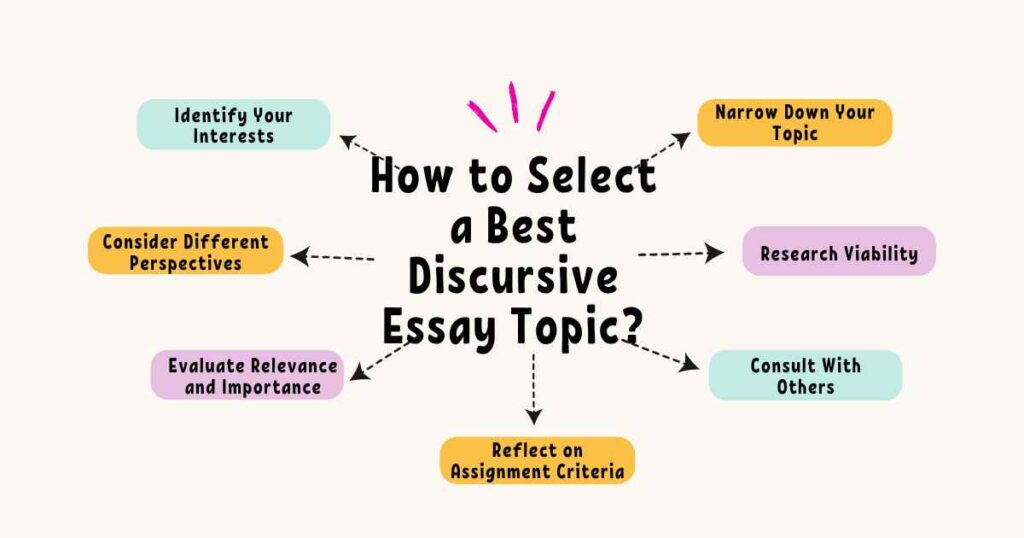A discursive essay is a form of an academic essay in which you express your beliefs or points of view in favor of or against the issue. This type of essay would help you to present your points of view objectively on all sides of an argument. We present 110 best discursive essay topics and tips across various themes to encourage exploration and discussion, providing a solid foundation for your writing.
For personalized guidance and support in mastering discursive essays, consider reaching out to Arvin AI, which can offer valuable insights and assistance tailored to your specific needs.
Read also: 400+ Compare and Contrast Essay Topics for Diverse Themes

What is Discursive Essay?
In a discursive piece you are expected to discuss a given topic and present an argument related to it. A discursive essay is written in order to present a topic in a balanced way. It presents all sides of an argument, and provides the reader with objective evidence about a particular topic. It is written in an impersonal style, which helps to keep things unbiased. This means that, as the writer of a discursive essay, you have to be very careful to avoid arguing for one viewpoint. Instead, you should try to keep your personal opinion out of the discussion.
The structure of a discursive essay is straightforward but essential. It has a snappy introduction, persuasive body paragraph and a cohesive conclusion. In the introduction, set the stage by clearly stating your stance or indicating a balanced view. The body paragraphs are the core, where arguments are built, each paragraph dedicated to a specific aspect of the topic. Finally, the conclusion summarizes key points and may include your final position. This structure ensures coherence and clarity.
How to Select a Best Discursive Essay Topic?
Selecting a discursive essay topic is a critical first step in writing an effective and engaging essay. Here’s a detailed guide on how to choose a suitable topic:
1. Identify Your Interests
- Personal Curiosity: Think about subjects you are passionate about or curious to explore further. Topics that interest you will make writing more enjoyable.
- Current Trends: Consider current events or social issues that are relevant and impactful. This can help you stay engaged and allow you to connect with your audience.
2. Consider Different Perspectives
- Multiple Viewpoints: Choose topics that have at least two or more differing opinions or arguments. Discursive essays thrive on presenting various sides of an issue.
- Controversial Issues: Topics that spark debate or controversy can lead to more dynamic discussions. Ensure that the topic is not overly polarized if you want a balanced exploration.
3. Evaluate Relevance and Importance
- Social Significance: Determine if the topic has broader implications for society or specific communities. Look for subjects that resonate with people’s experiences.
- Timeliness: Focus on contemporary issues or questions that are currently being debated in public discourse, as they will be more relevant to your audience.
4. Narrow Down Your Topic
- Specific Focus: Instead of a broad subject, concentrate on a specific aspect of the topic. For example, instead of discussing “climate change,” you could address “the impact of plastic waste on ocean life.”
- Framing Questions: Consider framing your topic as a question. Questions often spur more thoughtful responses and analysis, such as “Should schools ban homework?” or “Is social media harming our communication skills?”
5. Research Viability
- Availability of Sources: Ensure that there is enough credible information available to support your arguments and viewpoints. Academic journals, news articles, and expert opinions are good sources to consider.
- Diverse Opinions: Make certain that you can find reputable sources that represent various perspectives on the topic. This will enrich your essay and ensure balanced discussion.
6. Consult With Others
- Seek Feedback: Discuss potential topics with friends, family, teachers, or peers. They may have useful insights or suggestions that you hadn’t considered.
- Group Discussions: Engaging in discussions or debates about potential topics can help clarify your thoughts and refine your focus.
7. Reflect on Assignment Criteria
- Conform to Guidelines: Review any specific guidelines provided for the essay assignment regarding length, formatting, or thematic focus. Ensure your topic aligns with these requirements.
- Scope and Complexity: Ensure that the topic you choose is suitable for the length of the essay. It should be complex enough to allow for exploration while still being manageable.

Selecting a discursive essay topic requires careful consideration of your interests and the relevance of the issue. By following these strategies, you can choose a topic that is not only engaging but also allows for rich discussion and analysis. Remember, the quality of your topic will significantly influence the effectiveness and depth of your essay.
Best Discursive Essay Topics for High School Students
- Should high school students be allowed to choose their own curriculum?
- Is a four-day school week better for student well-being and education?
- Should schools replace traditional textbooks with digital versions?
- Do school uniforms contribute to a better learning environment?
- Should students be allowed to grade their teachers?
- Is participation in extracurricular activities as important as academics?
- Should schools enforce a strict cell phone policy during school hours?
- Are parent-teacher conferences necessary?
- Should community service be a compulsory part of high school education?
- Is it effective to have closed campus lunch policies for high school students?
Read also: Top 10 Research Topics for Students [2024 Ultimate Guide]
Best Discursive Essay Topics for College Students
- Should college education be free for everyone?
- Is the pressure to obtain a college degree worth it in today’s job market?
- Should colleges be allowed to enforce mandatory drug tests?
- Are student loans more harmful than beneficial?
- Should colleges have quotas for minority students?
- Is there a need for reform in Greek life on college campuses?
- Are online courses as effective as in-person classes?
- Should universities ban fraternities and sororities?
- Is it ethical for colleges to use animals for research?
- Should university students be required to learn a second language?
Political Topics for Discursive Essays
- Is democracy the most effective form of government?
- The implications of Brexit on the UK and the EU.
- Should political leaders have term limits?
- The role of the United Nations in maintaining global peace.
- Is a global government feasible or desirable?
- Can censorship be justified under any circumstances?
- The impact of lobbying on public policy.
- Should voting be mandatory?
- The ethics of political propaganda.
- Is nationalism a threat or a boon to global stability?
Best Discursive Essay Topics on Social Issues
- The impact of social media on interpersonal relationships.
- Does the modern education system prepare students for real-life challenges?
- Should voting age be lowered or raised?
- The pros and cons of gun control policies in the United States.
- Is the death penalty an effective crime deterrent?
- The ethical implications of euthanasia.
- Should countries have open or closed immigration policies?
- Is feminism still relevant in today’s society?
- The influence of advertisements on consumer behavior.
- Should schools enforce uniforms?
Technology Related Discursive Topics
- Will artificial intelligence eventually surpass human intelligence?
- Should there be regulations on the use of drones by civilians?
- The ethical concerns of genetic cloning.
- Is dependence on technology making humanity less capable?
- Can privacy exist in the age of the Internet?
- The effects of video games on youth behavior.
- Should the internet be considered a basic human right?
- The potential dangers of artificial super intelligence.
- How has technology changed the workplace?
- The future of space exploration.
Read also: 350 Expository Essay Topics & Tips for Academic Success
Best Discursive Essay Topics on Health
- Should there be a global policy on healthcare?
- The effects of fast food on the nation’s health.
- The ethical dilemmas of assisted suicide.
- Should vaccination be mandatory for all?
- The impact of pharmaceutical companies on healthcare.
- Is dieting effective for long-term weight loss?
- Should alternative medicine be covered by insurance?
- The consequences of legalizing drugs.
- Is there a right to die?
- The role of mental health awareness in schools.
Environmental Topics for Discursive Essays
- Should there be a worldwide ban on single-use plastics?
- The effects of global warming on biodiversity.
- Is nuclear energy a safe and sustainable option?
- The pros and cons of zoos and animal sanctuaries.
- Can industrial growth and environmental protection coexist?
- The effectiveness of the Paris Climate Agreement.
- Are electric vehicles the future of transportation?
- The impact of urban sprawl on the environment.
- Is organic farming the future of agriculture?
- The consequences of deforestation.
Ethical Discursive Essay Topics
- Is it ethical to use animals for testing?
- The moral implications of buying luxury goods.
- Should we modify our eating habits for ethical reasons?
- The ethics of using placebo in medical trials.
- Is it justifiable to break the law for a good cause?
- Should parents track their children with GPS devices?
- The moral questions surrounding abortion.
- Is wealth distribution a moral obligation of society?
- The ethics of surveillance for security purposes.
- Is honesty always the best policy?
Culture and Media Related Topics
- The representation of minorities in media.
- The impact of reality TV on society.
- Should art be censored?
- The influence of music on youth culture.
- Is the book always better than the movie?
- How does pop culture influence individual identity?
- The role of newspapers in the digital age.
- Should celebrities be considered role models?
- How has the internet affected traditional cultures?
- The commercialization of cultural festivals.
Read also: 160 College Essay Topic Ideas for an Outstanding Paper
Funny Discursive Essay Topics
- Should schools teach students how to become famous YouTubers?
- Is watching cartoons beneficial for adults?
- Should there be an upper age limit for people posting on TikTok?
- Are cats plotting to take over the world?
- Is pineapple on pizza a crime against cuisine?
- Should robots replace teachers?
- Are smartphones actually making us dumber?
- Is living in space better than living on Earth?
- Should there be a reality show in the White House?
- Is binge-watching TV shows better than reading books?
Best Discursive Essay Topics on Education
- Is homeschooling a better option than traditional schooling?
- Should physical education be optional in schools?
- How effective is the no-homework policy at schools?
- Should schools implement more technology in the classroom?
- Is the education system outdated for today’s society?
- Should moral education be taught in schools?
- How significant is the role of arts in education?
- Should sex education be mandatory in all schools?
- Are standardized tests a fair measure of student ability and intelligence?
- Should parents have a say in the curriculum?
How to Organize a Discursive Essay
Organizing a discursive essay involves structuring it in a way that clearly presents different perspectives on a given topic. Here’s a step-by-step guide to help you organize your essay effectively:
1. Introduction
- Opening Statement: Start with a hook to engage the reader. This could be a quote, question, or an interesting fact related to your topic.
- Background Information: Provide context for the discussion. Briefly outline the issue at hand to help the reader understand the relevance.
- Thesis Statement: Present your main argument or the aim of the essay. It should indicate that the essay will explore multiple viewpoints rather than just your own.
2. Body Paragraphs
Organize your body into clear, focused paragraphs. Each paragraph should address a different aspect of the topic.
A. Presenting Different Perspectives
- Paragraph 1: Present the first viewpoint. Explain its significance, supporting it with evidence or examples.
- Paragraph 2: Introduce a contrasting viewpoint. Again, provide evidence or theoretical support.
- Paragraph 3: Discuss another perspective that adds depth to the discussion. This can be a counter-argument to the previous points made.
B. Analysis
- Critical Analysis: Dedicate a paragraph or two to analyzing the arguments presented. Discuss the strengths and weaknesses of each viewpoint. This could also involve a comparison of the arguments.
C. Your Own Perspective
- Personal Opinion: If appropriate, articulate your own position based on the discussion presented. Justify your viewpoint with logical reasoning and evidence, showing how it aligns or contrasts with the previously discussed perspectives.
3. Conclusion
- Summarize Key Points: Recap the main arguments without introducing new information.
- Final Thoughts: Reflect on the importance of considering all viewpoints in understanding the topic deeply. Suggest areas for further exploration or implications of the discussion.
Additional Tips:
- Use Transitional Phrases: To maintain flow and coherence between paragraphs, use phrases like “On the other hand,” “Moreover,” “Conversely,” and “Additionally.”
- Stay Objective: Aim for a neutral tone. Although you may express your opinion, it should be backed by evidence and presented in a balanced way.
- Cite Your Sources: Whenever you use data, quotes, or examples from other works, make sure to cite them appropriately.
By following this structured approach, you can create a well-organized discursive essay that informs and engages readers while providing a balanced treatment of the topic.
Conclusion
Choose a topic that interests you and produce an outstanding discursive essay. Have you chosen the best discursive essay topic for your assignment? Do you require immediate assistance with creating a discursive essay? Please contact Arvin right away!
FAQs
A discursive essay is a genre of writing that asks you to investigate a topic; to gather, read and evaluate evidence; and to present a position on your topic based on the evidence gathered. An example may be “Is Social Media Beneficial or Harmful to Society?“
There are two basic types of discursive essay. Firstly there are persuasive essays in which you can argue strongly either in favour of or against a given discussion. Alternatively, there are argumentative essays where you look at a discussion topic in a balanced way.
A discursive essay is written in order to present a topic in a balanced way. It presents all sides of an argument, and provides the reader with objective evidence about a particular topic. It is written in an impersonal style, which helps to keep things unbiased.






